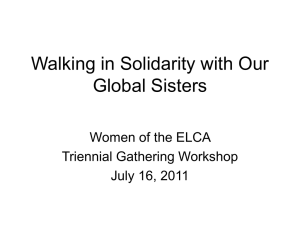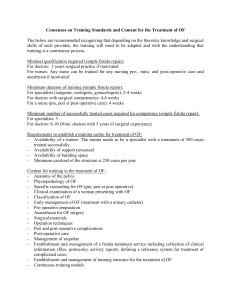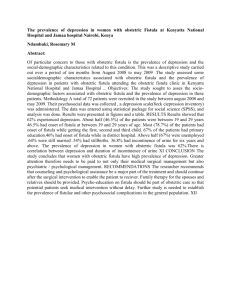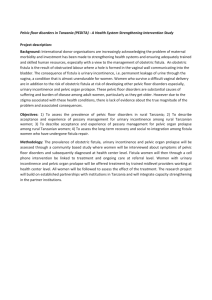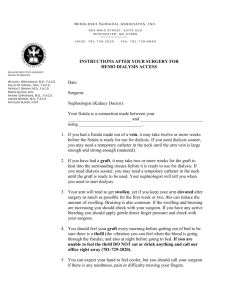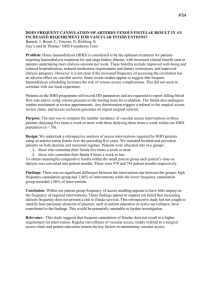Evidence
advertisement
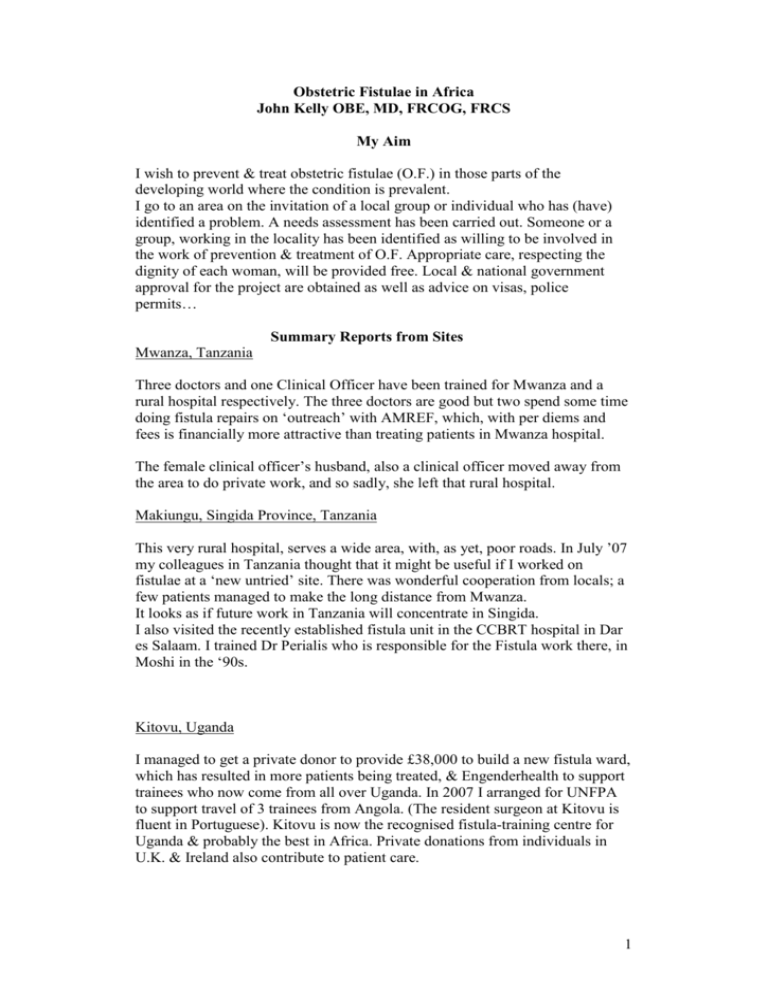
Obstetric Fistulae in Africa John Kelly OBE, MD, FRCOG, FRCS My Aim I wish to prevent & treat obstetric fistulae (O.F.) in those parts of the developing world where the condition is prevalent. I go to an area on the invitation of a local group or individual who has (have) identified a problem. A needs assessment has been carried out. Someone or a group, working in the locality has been identified as willing to be involved in the work of prevention & treatment of O.F. Appropriate care, respecting the dignity of each woman, will be provided free. Local & national government approval for the project are obtained as well as advice on visas, police permits… Summary Reports from Sites Mwanza, Tanzania Three doctors and one Clinical Officer have been trained for Mwanza and a rural hospital respectively. The three doctors are good but two spend some time doing fistula repairs on ‘outreach’ with AMREF, which, with per diems and fees is financially more attractive than treating patients in Mwanza hospital. The female clinical officer’s husband, also a clinical officer moved away from the area to do private work, and so sadly, she left that rural hospital. Makiungu, Singida Province, Tanzania This very rural hospital, serves a wide area, with, as yet, poor roads. In July ’07 my colleagues in Tanzania thought that it might be useful if I worked on fistulae at a ‘new untried’ site. There was wonderful cooperation from locals; a few patients managed to make the long distance from Mwanza. It looks as if future work in Tanzania will concentrate in Singida. I also visited the recently established fistula unit in the CCBRT hospital in Dar es Salaam. I trained Dr Perialis who is responsible for the Fistula work there, in Moshi in the ‘90s. Kitovu, Uganda I managed to get a private donor to provide £38,000 to build a new fistula ward, which has resulted in more patients being treated, & Engenderhealth to support trainees who now come from all over Uganda. In 2007 I arranged for UNFPA to support travel of 3 trainees from Angola. (The resident surgeon at Kitovu is fluent in Portuguese). Kitovu is now the recognised fistula-training centre for Uganda & probably the best in Africa. Private donations from individuals in U.K. & Ireland also contribute to patient care. 1 Darfur, Sudan Two doctors have been trained. The senior one is heavily involved with administration at the adjoining Medical School. The junior showed great promise but in ‘05 the government of Sudan offered him a scholarship to go out of the country to train as a pathologist. This was financially an offer, which he could not decline. The ‘Saudi’ hospital in El Fasher, Darfur where we have carried out the fistula work for the last 9 years is now the O. & G. centre for the area. All the medical staff are interested in the fistula patients but time, lack of private practice… are limiting factors. A new fistula ward was opened on my recent visit Feb/March ’08. 16 former fistula patients, now cured at the hospital, have completed the 18 months training & examination leading to a certificate as a ‘Village Midwife’. Sadly there are problems about getting them back to the villages where they are so desperately required & also with their funding. Monze, Zambia Monze has been designated the Fistula Centre for Zambia. We have established good relations with the University Teaching Hospital and the Ministry of Health in Lusaka. UNFPA have provided help with mattresses, soap & soap powder; with a new hospital administration it might now be appropriate for UNFPA to provide appropriate larger support. Monze is also leading Africa in training and upgrading clinical officers (licentiates) to do more e.g. establishing 24 hour appropriate emergency obstetric care services in rural areas. This is the way to reduce maternal mortality and morbidity (including fistulae) in Africa. We are currently training a clinical officer to do the simpler fistula repairs. He has been there for some time & it looks as if he will be there permanently. He is already competent in obstetrics and in knowing when and when NOT to do the various operative procedures. Much of the credit for this and the fistula work at Monze is due to Michael Breen MRCOG, the Obstetrician and Gynaecologist at Monze. I trained Dr Breen. Hageissa, Somaliland I have only made one visit there! I have been requested to return. The limiting factor is that the hospitals cannot treat more fistula patients without some funding. Somaliland, although peaceful, is not officially recognised as an independent country. Ethiopia My role at the Fistula Hospital is less than previously because of the availability of trained Ethiopian staff. In 2005 I had to tactfully raise the matter of declining standards in training. Many trainees coming from outside of Ethiopia have claimed that they do not get sufficient ‘hands-on’ training and that priority is given to Ethiopians. Of the last 100 Ethiopian doctors given 2 months training 2 at the hospital, only four continue to do any fistula surgery. The individual doctors are not to blame as many leave the country and those who remain find it difficult to accommodate fistula patients. There is much positive work going on in Ethiopia at the hospital and on outreach. Much of my time involves work on prevention at hospitals like Attat and Wolisso. Over recent years it is rare to see any fistula patients from the areas served by these hospitals and their community programmes. Berekum, Ghana The majority of fistula patients attending Berekum come from neighbouring (40km) Ivory Coast, from north of Berekum and from Burkina Faso. One doctor has been trained. The hospital is committed to the prevention of maternal mortality and morbidity. Pakistan My work involves sites in the interior of Sindh province (Larkana, Hyderabad, Nawabshah & Sukkur). The hospitals are part of, or have links with Medical schools. Ten gynaecologists have been trained and four continue to do fistula repairs in small numbers. Most of the fistula patients come from rural areas where health services are poor. The hospital in Sukkur is a small private hospital run by a surgeon who possesses great compassion & expertise in treating poor fistula patients (free). During ‘fistula camps’ significant number of patients are treated & trainees are encouraged to attend. Angola My work here, which commenced in’06, is mainly in the Northern Province of Uige. It is one of the most deprived areas in the developing world. Roads, transport, water supply & general infrastructure are so poor that few medics trained in Angola work in the province. Marburg Fever in ’05 resulted in 500 (official figures) deaths, including 6 doctors & 30 nurses in the hospital where I work. In ’06 & ’07 there were epidemics of Cholera & Typhoid, respectively. The consequent increase in demand for surgical treatment of typhoid perforations restricted operating facilities available for management of O.F. Maternal mortality & morbidity & infant mortality are high. This year I plan to spend May in Uige. I shall be accompanied by Drs Michael Breen MRCOG from Monze, Zambia & Ray Towey FFARCS from Gulu Uganda. Both have unique expertise in Obstetrics & Gynaecology & Anaesthetics respectively in the developing world. I feel Uige requires such an input in our efforts to treat & prevent O.F. & related maternal & infant mortality & morbidity. We will join the local volunteer doctors who have benefited from training at Kitovu, Uganda. Nigeria 3 Itam, Uyo was the second fistula hospital (after Addis Ababa) to be opened. Dr Ann Ward carried out the original work on prevention & treatment of O.F. in that part of the world, in the nearby Anua hospital. I had the privilege of relieving Dr Ward in ’66 &’67 & again assisting in further fistula work in Oct & Nov ’07. Funding for Fistula work from other Donors (Not already detailed) AMDD (Averting Maternal Death and Disability) gave US$30,000 for one year for Darfur, Sudan and a similar amount for the same period to Monze, Zambia. They were pleased with the projects and reports. They apologised for not being able to continue with funding but stated that their new programmes were directed more at improving health systems. Engender Health would also like to support the Darfur work. They were unsuccessful (in 2005) in obtaining the necessary (police) permit to visit El Fasher. The Sindh Doctors Association UK plus the local Chambers of Commerce and Rotary Clubs in Sindh, Pakistan have assisted with the costs of patient care. In Mwanza, Tanzania I have managed to get a U.S. philanthropist to assist financially with the O.F. work The Fentam Trust has recently donated essential anaesthetic equipment for Angola. Sustainability Sustainable development is a dynamic process, which enables all people to realise their potential and to improve their quality of life. For Obstetric Fistulae this means prevention and appropriate treatment, free. I have involved local health care personnel and consumers (patients). Education for all is basic to health improvement with emphasis, in my work, on the girl child and the poor. I have highlighted some of the problems of health care providers – higher salaries ‘abroad’ entice some who have been trained, to emigrate. DFID was one of the initiators in highlighting this problem. I am involved in training non-doctors to do more and better obstetrics and to do fistula surgery. These motivated professionals are ‘not marketable’ in the West. I have shown where even an NGO (e.g. AMREF – there are other examples) by providing attractive per diems, may entice trained fistula surgeons to work outside the area for which they were trained. We have shown the valuable role, played by the cured fistula patients in prevention and treatment. A tactful approach to doctors and their professional organisations is required for this to work. Research 4 I am basically a clinician, but also believe that it is important to try to obtain the facts & to encourage local feasible research in the field of Maternal Mortality & Morbidity, including Obstetric Fistulae. Our aim is prevention & treatment. I have encouraged simple relevant data collection sheets on fistulae at the various centres. A system of grading the severity of the injury (i.e. the fistula), meaningful & acceptable to all, would assist in any comparative studies & results. I am also involved in similar schemes in Maternal Mortality & Morbidity. I was invited to lecture at Duke University, North Carolina on Ethical Challenges in treatment of O.F. March ’07. The International Federation of Obstetrics & Gynaecology (FIGO) in Nov ’07 requested that I contribute to their manual on Competency & Training in O.F. I have been invited to participate in a Fistula Partners’ meeting organised by EngenderHealth, in Accra, April 15- 17. Dept. of Public Health & Epidemiology, University of Birmingham: I am fortunate in being able to continue this collaboration in Epidemiology (honorary, part-time). Together with my colleagues we feel strongly that we owe it to the poor women who suffer maternal morbidity to obtain robust scientific evidence so that we may inform correct, appropriate health care policies at regional, national & international levels. My colleagues & the Public Health doctor with whom I work in Pakistan have used Cluster Randomisation to show how involving trained Traditional Birth Attendants in Pakistan has significantly reduced still birth rates. Maternal Mortality was also reduced, although the numbers were not large enough to reach statistical significance. In addition to publications on Fistulae I have published on Ruptured Uterus (245 consecutive patients in rural Ethiopia). Within the Dept of Public Health I am involved voluntarily in assisting in the supervision of research by intercalated medical students & in providing academic links for them to visit & conduct studies in several different developing countries. I also teach, part-time, on the recently introduced B.Med.Sci. in International Medicine course Recent Publications: Kelly J, Winter HR. Reflections on the knowledge base for obstetric fistula. Int J Gynecol Obstet 2007; 99: S21-24. Kelly J, Moghul FA, Pisani V. Double Ureter at Repair of Obstetric Fistula. Int J Gynecol Obstet 2008 (In Press) On 19 Jul.’07 the University of Birmingham awarded me the degree of Doctor of Medicine, honoris causa. 5 Plans for the coming year: I wish to continue working in the field of Treatment & Prevention of O.F. This will mean return visits to Angola, Ghana, Uganda, Ethiopia, Nigeria, Tanzania, Pakistan, Sudan, Zambia &, war situation permitting, Somalia. Our Training Programmes require continuous evaluation, feed back from colleagues, those we have trained & ideally from patients. While we are open to new teaching techniques, nothing can replace basic ‘hands-on’ training (back breaking for trainer!). Those recently trained in fistula surgery, are advised to tackle only the simpler cases for first two years. The trainer should be available for return visits to assist / provide support with difficult problems John Kelly 22nd September 2008 6
